More from Eritrea seek life of peace in Maryland
 They had come to the two-room stone house where Abeba Hagos Enday lived with her four children to conscript her husband into the Eritrean army. When she told them - truthfully, she says - that she didn't know where he was, they gave her an ultimatum: Find him before we come back, or we will kill you.
They had come to the two-room stone house where Abeba Hagos Enday lived with her four children to conscript her husband into the Eritrean army. When she told them - truthfully, she says - that she didn't know where he was, they gave her an ultimatum: Find him before we come back, or we will kill you.
"I had to leave," Enday says through an interpreter.
Enday, 39, is one of about four dozen Eritreans who have arrived in Baltimore since July, the first members of a group that resettlement officials expect to rival the current big three - Iraqis, Bhutanese and Burmese - in admissions during the next year.
"This population is coming," says Robert Warwick, director of the Baltimore office of the International Rescue Committee, which is resettling the Eritreans locally. "For years, resettlement was stagnant, but now the U.S. government has identified numbers, and they're being processed."
The Eritreans, many of whom have limited education and speak little or no English, arrive in a job market that is challenging for Americans. So far, only a few have landed jobs - one in retail, others in a sporting-goods warehouse. But two Eritreans who agreed to be interviewed said their pros- pects here were better than back home. They have fled what an Rights Watch" target="_blank">Human Rights Watch described this year as a human rights crisis in the African country, where a repressive dictatorship is accused of arbitrary detentions, forced labor and torture. Using a border dispute with Ethiopia as a pretext, President Isaias Afwerki has suspended elections, outlawed opposition groups and arrested journalists.
The United States, which typically accepts more refugees annually than the rest of the world's nations combined, took in more than 1,500 Eritreans during the 2009 fiscal year. Countries in which smaller numbers are being resettled include Canada, Australia and New Zealand.
Fifty-three Eritreans were resettled in Maryland, where it is hoped that they will connect with the large Ethiopian community in Washington. While Eritreans fought a war of independence with Ethiopia from 1961 to 1991 and the countries waged a border war from 1998 to 2000, their peoples see themselves as brothers and sisters. Ethiopia is a common destination for Eritreans fleeing their country.
Local staffers of the International Rescue Committee pick them up at BWI- Thurgood Marshall Airport, take them to apartments stocked with food and help them with shopping, health screenings, English classes, job training and legal services. But funding is limited, making it crucial that they find paying work as soon as possible.
Warwick, who headed IRC operations in Eritrea for two years until the government ejected international aid groups in 2006, sees hope.
"We find that they're very energetic - they're anxious to get that first job," he says. "This is a serious group of people about work and about education."
One former soldier, who was imprisoned as a dissident in Eritrea, says he will do any kind of work.
"I'm more inclined to physical labor," says the man, 45, who spoke on condition of anonymity. "Because I was not educated, I'm willing to work any job. I'm eager to start right away."
Warwick also sees cause for optimism in what he says is a growing cohesion among the Eritreans. Unusual for a new population, some have asked to join IRC staff in picking up arrivals at BWI.
"These are people that they didn't know, but they wanted to show support," Warwick says. "We don't usually see this, where someone's just come in, a month, two months ago, and already they want to go out and greet. ... It was just a great thing for the arriving Eritreans to feel like they've got a connection right away."
The IRC is resettling Eritreans near one another in Northeast Baltimore in the hope of fostering a community.
Enday, who helped her husband run the family farm in Eritrea, says she feels safe in the United States. But she misses the child she couldn't bring with her.
The woman says she begged her husband to escape Eritrea after police threatened her, but he refused. So she left in October 2006, taking two of their children while her husband was working, slipping across the Ethiopian border to leave them at the United Nations refugee camp at Shimelba, then going back for a third.
She says she was unable to take their fourth child, an 8-year-old boy. She feared that she would be arrested if she attempted the trip again.
She spent 2 1/2 years at the refugee camp before coming to the United States in July. She said she has had no communication with her husband or son since leaving Eritrea.
"I don't know if they survive," she says, her eyes welling with tears. "My husband might have gone to another wife. He might have started a new life."
She is hopeful that her husband and son will make it to Shimelba, where she has left their names and her destination with camp officials. She has no plans to return to the region.
"Living here in the United States is much better than where I was, with no rule of law, where anyone can do anything to you," she says. "At least you can sleep in peace. You will not starve here.
"If my country gets rid of this dictator, then definitely I will go back home. If it is a land of peace."
Copyright © 2009, The Baltimore Sun


![[AIM] Asmarino Independent Media](/images/logo/ailogo.png)
